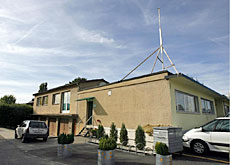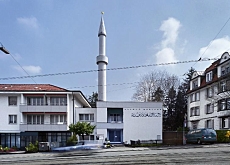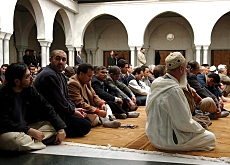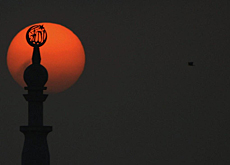Minaret row rumbles on in Switzerland

Projects to build minarets in several communities in German-speaking Switzerland have come up against strong opposition from local residents.
On Monday the Zurich cantonal parliament said it would look into banning the construction of minarets across the canton.
The decision came after parliament accepted an initiative from the rightwing Swiss People’s Party calling for the canton’s planning laws to be altered to forbid minarets.
The move has been condemned by centre-left and centre-right parties as well as by a leading Muslim organisation in the canton.
This is not the first time the issue has caused controversy. Earlier this year local authorities blocked the construction of a minaret in Wangen in northern Switzerland and in Langenthal in canton Bern.
Minarets already exist in Zurich and Geneva. They are symbolic and are not generally used to call the faithful to prayer.
Swiss-Yemeni political scientist Elham Manea says the debate has revealed some deep-seated fears among certain Swiss.
“It’s the fear of not being able to ignore a Muslim presence,” she told swissinfo.
Fears
These fears should be taken seriously and not seen as anti-Muslim feeling, added Manea. Islam is being portrayed negatively, especially by the media, and is being linked to violence at the moment, she said.
But Manea also understands the Muslim community’s desire to be able to practise its religion freely in Switzerland, which she says is also its right.
Saïda Keller-Messahli, president of the Forum for Progressive Islam, says the minaret projects are the Muslim community’s desire for a visible presence and an open debate on the question.
But she told the SonntagsZeitung newspaper in August that for the more conservative Muslim associations in Switzerland minarets seemed not to be a symbol of openness but of “claims to leadership” of the Swiss Muslim community.
Manea says that dialogue is the way forward. Muslims and non-Muslims should meet regularly to get to know each other.
Differences
There are also countrywide differences over the issue. No plans to build minarets have been put forward in the Italian-speaking canton of Ticino.
According to Stéphane Lathion, an expert on Islam in Switzerland at Fribourg University, two large Muslim cultural centres are planned for Lausanne and la Chaux-de-Fonds in the French-speaking part of the country, but the organisers are likely to forgo the minarets to be able to complete their projects.
“In the German-speaking part of the country most Muslims are from Turkey and the Balkans. It has taken time for their voices to be heard. Perhaps the religious or cultural claim that now seems the most important to them is the minaret,” Lathion told swissinfo.
“In the French-speaking part, it’s less of an ongoing issue because most Muslims who appear in the media speak Arabic and mostly feel attached to the Geneva mosque. This has reduced any desires for a minaret.”
But Lathion added that there were still fears in the Muslim community about a public outcry over minarets.
Hafid Ouardiri, spokesman for the Geneva mosque, said there had never been any objections to its minaret, built in 1978.
He said the debate, which seemed to mobilise extremist points of view, had not taken place in the French-speaking part of Switzerland. “Perhaps there is more ignorance on the subject [in the German part] than in the French part,” he said.
The minaret problem has also been noted by the federal authorities. The Swiss Federal Commission against Racism last week called for more tolerance towards Muslims.
It called on local authorities to show greater flexibility over building and zoning restrictions to allow the construction of religious buildings and to “reduce populist pressures”.
swissinfo
There are about 340,000 Muslims in Switzerland, coming mainly from the Balkans and Turkey.
Their numbers are growing in Switzerland. They represented 2.2% of the population in 1990 and 4.3% in 2000.
One of the main reasons for the rise is the arrival of refugees from the former Yugoslavia.
A minaret is a tower, traditionally part of a mosque, with a balcony from which a muezzin calls Muslims to prayer. In modern mosques, the minaret is equipped with loudspeakers.
In Switzerland, only the mosques in Geneva and Zurich have a minaret. The call to prayer is not made from these minarets.
Swiss Muslims can meet in more than 120 prayer locations, generally in Islamic culture centres.
Apart from Wangen and Langenthal, plans have been mooted for minarets in Wohlen in canton Aargau and near Biel in canton Bern. Plans to build minaret in Wil in canton St Gallen have been opposed.

In compliance with the JTI standards
More: SWI swissinfo.ch certified by the Journalism Trust Initiative



You can find an overview of ongoing debates with our journalists here. Please join us!
If you want to start a conversation about a topic raised in this article or want to report factual errors, email us at english@swissinfo.ch.